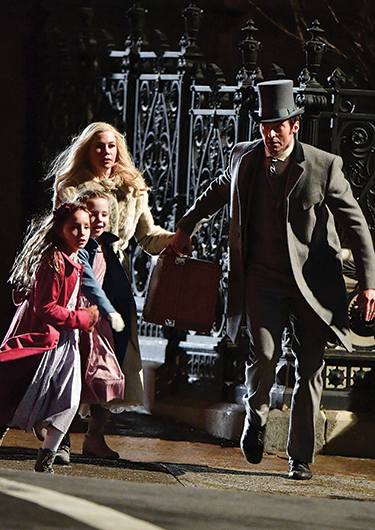On an outdoor Brooklyn soundstage in the early spring of 2017, the 1830s were on full display. Men wearing tailored overcoats and top hats, who moments before were removing earbuds and setting their cell phones to silent, strolled along a dusty street, holding canes in one hand and the arms of properly corseted women in the other. Behind them, a horse and carriage paced against a hazy atmosphere created by a fog machine.

In the wings, ready to join the big street number, were Hugh Jackman and Michelle Williams. Suddenly, they shed their parkas and twirled to the center of the shot. Williams kicked up her period-piece boots before landing in the arms of Jackman, as he belted out the words to a song written by Benj Pasek, ’06, and Justin Paul, ’06.
Standing in separate scrums with camera operators, the two graduates of U-M’s School of Music, Theatre & Dance watched intensely as their melody came to life in “The Greatest Showman.” The big-scale, big-budget musical about the life of P.T. Barnum is scheduled for a Christmas day release by 20th Century Fox.
When the director finally yelled “cut” and Jackman, radiating movie star charisma, walked past, Pasek was heard murmuring to no one in particular, “What more could you ask for?”
An Academy Award?
The songwriting duo already got one of those less than a month earlier. Pasek and Paul (the alliteration making the constant pairing of their names irresistible) won the Oscar for best song. The two wrote the lyrics for half a dozen tunes in the movie “La La Land,” including the winning song, “City of Stars.”
A Tony Award?
That would come a few months later, on June 11, when the men would bound onto the stage of Radio City Music Hall to accept not one, but two Tony Awards for best original score and best musical for their Broadway hit “Dear Evan Hansen.” (The production won six of the nine Tony nominations it received.) The musical is a painfully gorgeous examination of the impact of social media on families trying to cope with both everyday annoyances and extraordinary anguish.
A solid meal was hard to come by, though. On “The Greatest Showman” set—after spending most of the day rehearsing a song with Williams—the two stars had snacked only on shrimp dumplings and crackers from the crew’s buffet. A vacation would have been nice, too. The men have toggled nonstop for months between work on “La La Land,” “Dear Evan Hansen,” and “The Greatest Showman.” Next up is a live-action remake of “Snow White” for Disney. (These guys write like they’re running out of time.)

“We are so thankful for all the opportunities we are being given and so we can’t say no to new projects,” explains Paul from their “Greatest Showman” office, a makeshift music studio with microphones, soundboards, desks, and couches. “We have major musical theater FOMO,” adds Pasek, using the millennial-speak acronym for “fear of missing out.”
It was also one of their first nights back on the film set since the 2017 Academy Awards. At the ceremony, they shared both the euphoria of winning the best song award and the cringe-worthy awkwardness of being on stage when the Oscar producers realized that Warren Beatty and Faye Dunaway had mistakenly presented best picture to “La La Land,” rather than the actual winner, “Moonlight.”
The duo is accustomed to live events and the unexpected things that can happen on stage, but the Oscar snafu was on a different level altogether. “Wild night!” says Pasek, somewhat understatedly.
“What happened knocked everyone back, and we all had a hard time getting our heads back on straight,” Paul says.
One person who still managed to soak in the glamour of the Oscar parties was Pasek’s mother, thanked by her son in his acceptance speech. (“She let me quit the JCC soccer league to be in a school musical,” he said.) This sweet moment prompted “Hamilton” creator Lin-Manuel Miranda to tweet a picture of himself and Pasek’s mother posing at an after-party with the caption, “Seriously, @benjpasek’s mom, thanks for letting him do the school musical, we are all better for it.”
“My mom’s a little full of herself since Lin-Manuel tweeted her,” Pasek jokes.
Though both music men are close to their parents, and Paul and his wife now have a 1-year-old daughter, the creative partners still spend the majority of their time with each other. Not surprisingly, there are occasional tensions.
“You can get the most angry and the meanest and most passionate with a family member because you know your brother is not going to stop being your brother,” explains Pasek. “We can fight and argue and have contentious debates because there is the safety of having a long-standing collaboration and enough projects behind us and in front of us.”
Adds Paul, “What he means is we feel trapped.”
There is an uncanny rhythm to their dialogue—not just the clichéd “they finish each other’s sentences” kind of cadence, though they do. It’s more like they deliver each other’s punch lines.
The two met in Ann Arbor at age 18 during summer orientation, before their first semester at U-M had even begun. They then bonded further in a ballet class freshman year. “We both were clean-cut suburban kids who thought we were really cool,” Pasek remembers. (Paul grew up in Westport, Conn., and Pasek in Ardmore, Pa.) “I was beat-boxing, and he was freestyle rapping. We really thought we had it going on.”
They had both enrolled at Michigan with the intention of enjoying moderately successful careers in musical theater.
“We thought we’d be on Broadway, like in the ensemble of ‘Thoroughly Modern Millie,’” Pasek recalls.
“Then we learned we were terrible performers,” Paul says.
Their first U-M play helped sealed their fate and friendship. “We got cast in the two smallest roles in ‘City of Angels,’ the musical,” Pasek remembers. He earned the role of “Man With Camera,” while Paul landed the part of a back-up dancer. “Back-up dancer slash Clapper Boy,” Paul says, correcting him.
“We started shifting our focus to writing.” From then on, they studied musical composition, learning the need for subtext, clarity, and economy in both melodies and lyrics, while writing and performing together around campus in cabarets and other shows. Amid it all, they also enjoyed a traditional U-M experience, with all the frivolity of college life. “All these musical theater people going to football games is hilarious,” Pasek says. “It’s most people’s first contact with sports, and they care more about the half-time show.”
By the end of their sophomore year, the two had written their first production together: “Edges,” a song cycle about the challenges of moving into adulthood. Performed by friends at the Kerrytown Concert House, it was so popular they took the show on an East Coast tour. Some of the songs went viral on the web. Since then, musical theater students from Australia to Asia have staged productions of “Edges.”
Pasek then tapped into Broadway’s vaunted “Michigan Mafia”—the nickname given to U-M’s numerous alumni populating the theaters of New York. That list includes, among others, “Hamilton” producer Jeffrey Seller, ’86, Tony Award winner Gavin Creel, ’98, and Andrew Lippa, ’87, who wrote the music and lyrics for “Big Fish” and “The Addams Family.”

Jeff Marx, ’93, a co-creator of “Avenue Q” who won a Tony Award in 2004, hired Pasek as an assistant in New York the summer after his sophomore year. Marx became so convinced of the magnitude of a Pasek and Paul partnership he urged the pair to spend the following summer in New York working exclusively on their music. The problem was, Paul could not afford to write and not work. Marx offered to pay Paul $7,000, which he initially refused. But when Marx turned it into a wager, telling him he could pay him back if he made it to Broadway in the next decade; Paul agreed to the loan.
In 2012, the duo came close to reaching that goal when their musical version of the film “Dogfight” did well Off Broadway but did not make it to the Great White Way. Yet that same year, the stage version of “A Christmas Story,” for which they wrote the music after the initial composer was let go, became a hit. On its opening night on Broadway, Paul handed Marx a check. The musical also earned Pasek and Paul their first Tony nomination.
“They have helped give contemporary music relevance on Broadway, showing that a musical can have such depth,” says actress Jennifer Laura Thompson, ’91, speaking just hours before appearing in the role of a mother in “Dear Evan Hansen.”
Thompson first met Pasek and Paul at a read-through of a script for the musical. “I was blown away,” she says, and continues to be. “They are hilarious, they’re intense, they’re both gorgeous and really nurturing, and I can’t get over how smart everything they say is.”
Paying it forward, Pasek and Paul remain devoted to U-M. This past April, they returned to campus, not just to receive Bicentennial Alumni Awards, but to perform at two commencement ceremonies. At the School of Music, Theatre & Dance, held at Hill Auditorium, they were also the keynote speakers. At the all-campus graduation in the Big House, they showed few nerves when they performed in front of a crowd of nearly 50,000.
At both ceremonies, they treated the audiences to “City of Stars” (with Paul on piano and Pasek on vocals), as well as a song they specifically wrote about the University, “Amazing Blue,” which they performed with this year’s musical theater graduates.
But it was during their back-and-forth commencement speech at Hill, with students looking up at them from where they had sat a little over a decade earlier, that they struck a more serious tone.
“We came to the University to be Broadway actors,” Paul said. “But that was really because we were in love with music and theater. We loved the art form, and then we started writing songs, making things, and became songwriters.”
Pasek continued the speech. “Don’t just be an identity, be a story—a story that starts here with this family of friends and the school of music practice rooms and the sweaty dance halls, with your sweaty dance belts, with endless bus rides between campuses and randomly profound conversations by a piano-shaped pond. It is a story that will continue to evolve if you let it.”
The students cheered loudly at the end, but never more than when Pasek added as an aside, “Send us your resumes.”
Katherine Rosman, ’94, is an editor and reporter for The New York Times.





